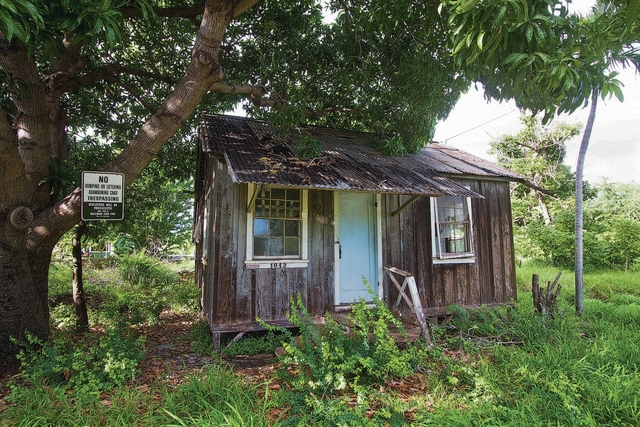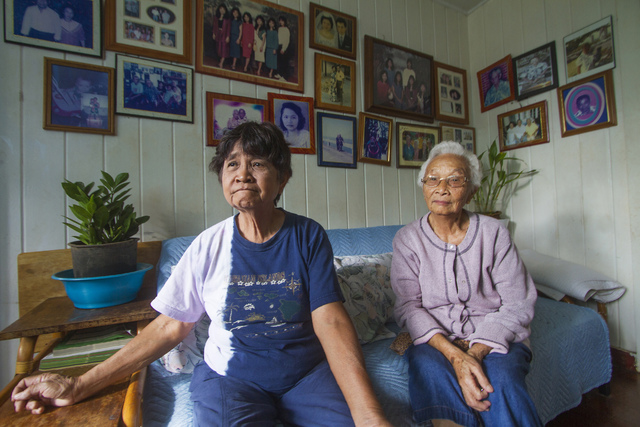Agnes Malate describes Varona Village as a historic, close-knit community unlike any other place.
She remembers growing up in the plantation village where neighbors would check on her grandparents when her parents were working, and where a group of teenage boys looked out for the community.
Little has changed at Varona, an area described by some as the place time forgot. The 26-acre Ewa community, with about 90 lots, is dotted with abandoned houses, vacant lots and the well-manicured yards and modest homes maintained by former plantation workers and their families. Many of the streetlights do not work, and some of the roofs leak.
Malate hopes city plans to redevelop Varona will allow her parents and other longtime residents, many of whom have waited decades for promised renovations and are in their 70s and 80s, to purchase homes at affordable prices. But she expressed frustration over the years of waiting and unfulfilled promises.
“I want to be hopeful and optimistic, but I know the realities of the past,” Malate said. “It takes a community to push forward what our hopes and visions are. I’m hoping that it’s the right time.”
City officials said they plan to issue a request for proposals in July or August seeking developers interested in rehabilitating the former sugar plantation village. The RFP process should be completed by the end of this year, and a subsequent development agreement will need approval from the City Council, the city said. Once developers submit proposals, project schedules and a budget will be further explored.
At a community meeting Tuesday at the D.E. Thompson Village, with about 40 to 50 people in attendance, several residents expressed frustration at waiting years for promised renovations, arguing that fixing up Varona should be a priority. Others said they were concerned with the affordability of the homes once redeveloped and the preservation of the historic area. Some suggested that longtime residents are given options to buy, continue renting, or rent-to-own their homes.
There are currently 20 tenants — former plantation workers or their spouses — who rent their homes for about $32 to $150 each month. Rent is determined based on names on the lease and marital status.
There are 18 other renters who pay between $350 to $400 per month. The city has not allowed additional renters in Varona for several years.
Fely Bailey, who lives in Varona to care for her 85-year-old mother, said she is worried about the affordability of the home once it is renovated. Bailey, 64, said she and her mother are both on fixed incomes, and hopes there is a rent-to-own option. Bailey, whose father worked on the plantation, said they pay $41 in rent each month.
She said she would like the city to “make it nice,” adding, “Fix the house a little bit, (but) leave it as it is,” referring to preserving the area’s character.
Crescencia Malate, Agnes Malate’s mother, has lived in Varona since 1971 and said she would like to buy her home at an affordable price. The 75-year-old said she hopes the neighborhood’s character will be preserved.
Keith Ishida of the city Department of Community Services, the agency overseeing the RFP, said Tuesday during a community meeting that questions including purchasing options would be further explored when developers submit proposals. He told residents that he “cannot guarantee you success” but added that “what I see in Varona is a ton of potential.” He said a possibility could be for a developer to offer affordable housing to the former plantation workers and then recoup money by building market-rate homes on the vacant lots.
Ishida added that the developer selected by the city would be vetted in the community.
“We understand the need to preserve Varona. We understand the need to revitalize it,” Ishida said. “There’s vacant lots that can be developed for new housing, as well as the residents themselves have done a pretty good job in preserving the housing they have.”
Mayor Kirk Caldwell said in a statement that the city offers some existing programs that could assist Varona residents, such as a loan program that could be used to help residents fix up their homes.
Varona, one of eight communities in Ewa Villages, was built for Ewa Plantation Co. workers and their families between 1900 and the 1950s. When Oahu Sugar, Ewa Plantation’s successor, shut down in 1995, the city acquired Varona and nearby Tenney and Renton villages. The city promised that the former plantation workers could stay and rent their homes, and drafted a plan to rehabilitate the area and give tenants an option to buy their homes. Tenney and Renton have largely been renovated, and lots were sold to residents and other buyers.
But redevelopment efforts have languished over the years at Varona due to, among other things, the closure of the city’s lead housing agency involved in the master plan, failed attempts to trade the property for state land, and a scam orchestrated by a former city housing official who stole $5.6 million from the Ewa Villages redevelopment fund.
City Councilman Ron Menor, who represents the area, said he hopes the city will select a developer and finalize an agreement by the end of the year. He added that he plans to hold additional community meetings.
“I know all of us would agree that the redevelopment of Varona Village is long overdue,” Menor said at the meeting. “I think it’s about time for the city to move forward.”
AGNES Malate, who has been involved in the community push to fix up Varona for many years, said other community meetings will further explore rental and purchasing options, as well as the possibility of allowing plantation workers’ children to buy their parents’ homes.
“There was no transition plan, so they (plantation workers and families) were left. There’s not necessarily a contract that says you will be able to purchase this home, but promises then were just as good as having something solid like that,” she said. “People want to move forward. People want to make it happen. But I would have to say we just need to continue to work on it.”




